We transition from the magical map to the actual sea. There’s a storm brewing and within the Dawn Treader, Eustace is writing in his diary again. “For reasons beyond my comprehension,” he gripes, “we’ve taken the advice of a senile old coot who doesn’t possess a razor and dawdles around in a dressing gown.” I love that there’s a character in the movie who feels the same way about that last scene that I do. “So we’re back in this tub and lost in a tempest. Brilliant.” We see some of the crew valiantly trying to navigate the storm. This scene isn’t bad, but I’m surprised the movie isn’t trying to make this more intense. Other parts, like the scenes on the Lone Islands, seek to make the story more action-packed than it is in the book. What I imagine though reading C. S. Lewis’s description of a storm at sea is a lot scarier.
It seemed to Lucy that a great valley in the sea opened just before their bows, and they rushed down into it, deeper down than she would have believed possible. A great grey hill of water, far higher than the mast, rushed to meet them; it looked certain death but they were tossed to the top of it. Then the ship seemed to spin round. A cataract of water poured over the deck; the poop and forecastle were like two islands with a fierce sea between them. Up aloft the sailors were lying out along the yard desperately trying to get control of the sail. A broken rope stood out sideways in the wind as straight and stiff as if it was a poker.
Oh well. Like I said, this isn’t a bad little scene in the movie. Maybe it just needs some dramatic music.
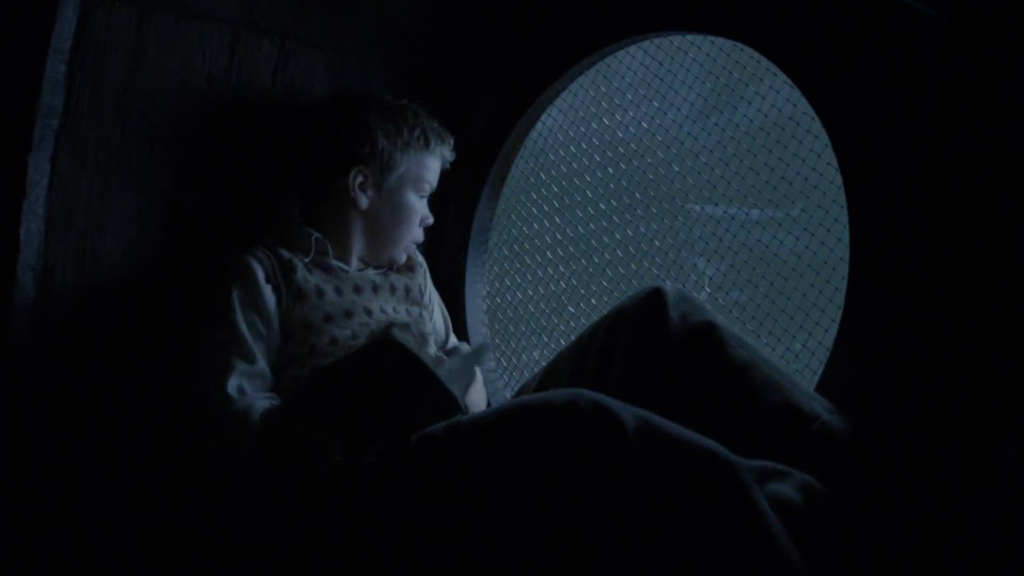
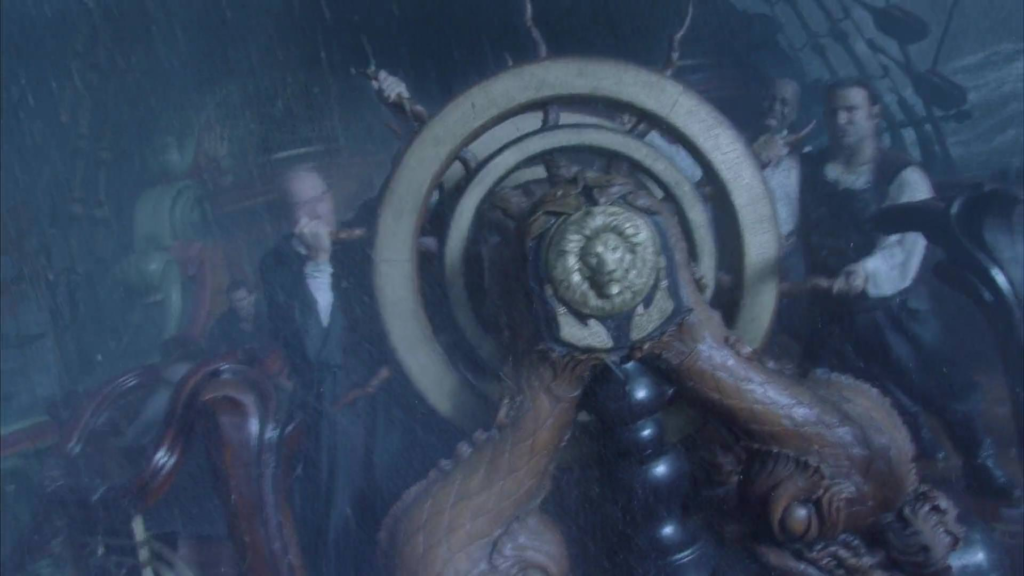
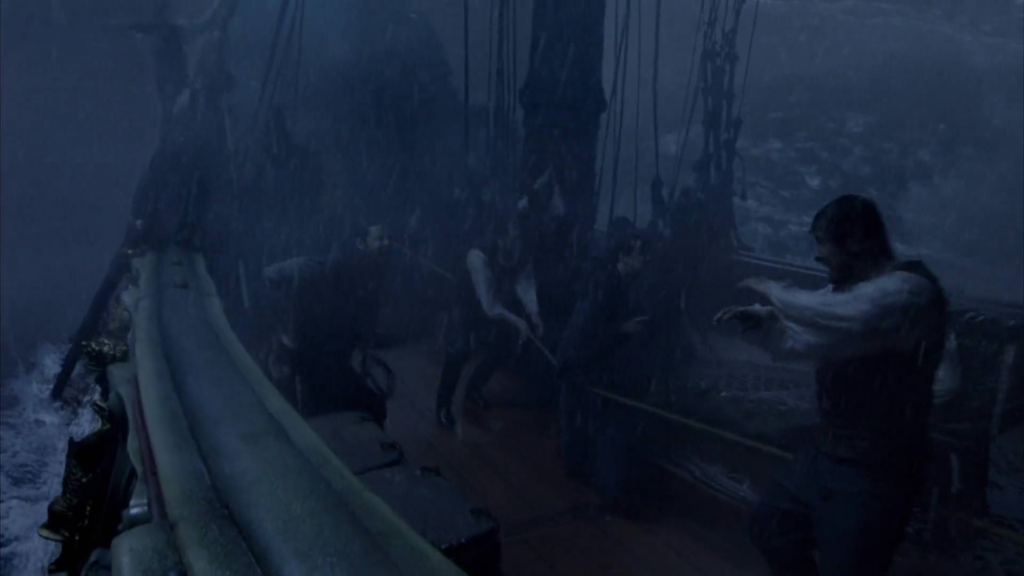
“Fourteen days of being tossed like a pancake and not the slightest sight of land,” laments Eustace. “The only consolation is everyone is finally as miserable as I am. Except for that showoff talking rat. He’s one of those annoying glass-is-always-half-full types.” We see Reepicheep standing on the nose of the Dawn Treader’s dragonhead prow. I’d like to think this is meant to be a reminder of his thirst to find Aslan’s country and “the utter East.” It’s hard to tell though since that part of his character ends up feeling like an afterthought in this movie. Still, it’s possible that was the intention.
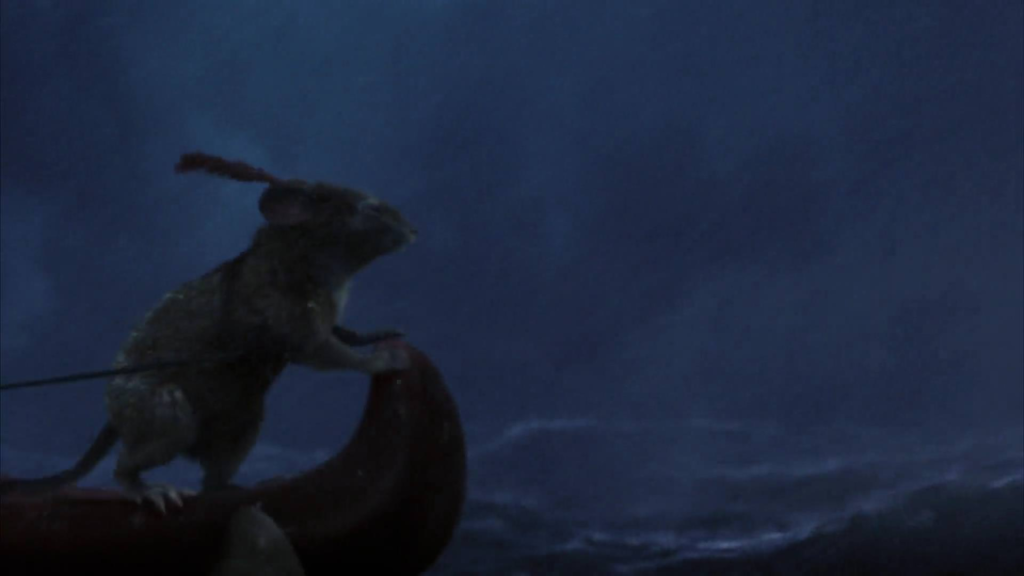
In the stern cabin, Drinian is having a private word with Caspian and Edmund. “We’re stuck here,” he says placing a marker on a map, “at half rations with food and water for two more weeks maximum. This is your last chance to turn back, Your Majesties. There’s no guarantee we’ll spot the blue star anytime soon. Not in this storm. A needle in a haystack, trying to find this Ramandu place. We could sail right past it and off the edge of the world.” “Or get eaten by a sea serpent,” says Edmund mockingly. That’s to say, I think he’s saying it mockingly. Given what happens later, I believe the subtext is that Edmund is genuinely nervous about sea serpents and is hiding it behind a show of bravado but Skandar Keynes’s performance in this movie is just too indifferent to convey anything that nuanced.
Drinian: I’m just saying the men are getting nervous. These are strange seas we’re sailing, the likes of which I’ve never seen before.
Caspian: Then perhaps, Captain, you would like to be the one to explain to Mr. Rhince that we’re abandoning the search for his family.[1]Technically, it’s just the search for his wife but whatever.
Theoretically, I have no problem with that line. All three characters in this scene have been sailing with Rhince and MLG[2]That’s what I’m calling his daughter, remember? for weeks or possibly even months. Of course, they care about them. But I haven’t been sailing with those characters and the line has the unfortunate side effect of reminding me that I don’t care about them, not nearly as much as the movie wants me to care anyway. Drinian ceases to argue but before leaving the cabin, he warns Caspian and Edmund, “The sea can play nasty tricks on a crew’s mind. Very nasty.”
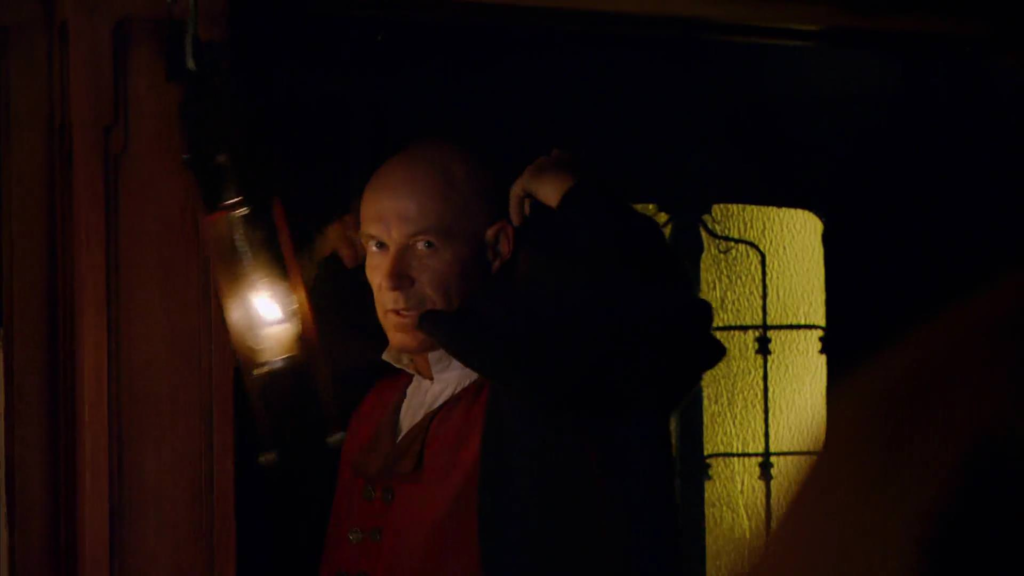
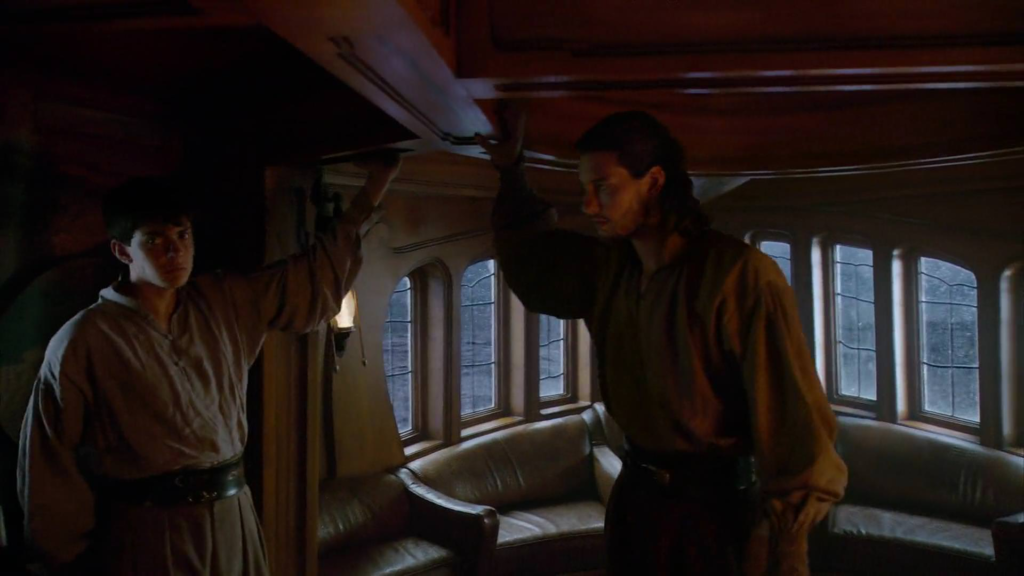
In Lucy’s cabin, a lantern sways from the roof as the ship is rocked by waves. After making sure that MLG is asleep beside her, Lucy takes out the page she tore from Coriakin’s spell book. She reads from it as Green Mists swirls around the lantern to make sure we know this bad.
Transform my reflection.
Cast into perfection
Lashes, lips and complexion.
Make me she whom I’d agree
Holds more beauty over me.
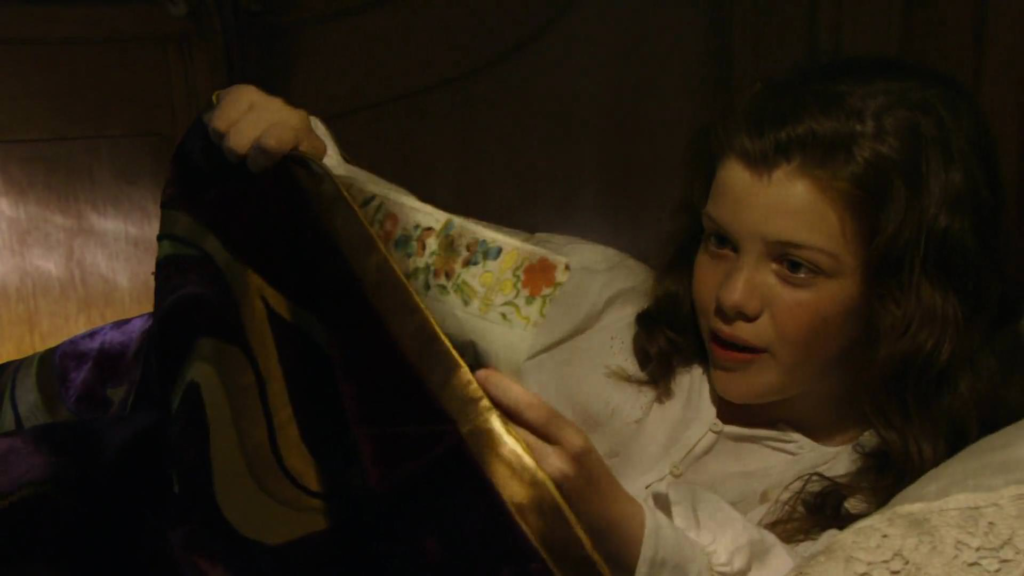
The sound of thunder fades away. The ship is suddenly still and light pours from the windows. Lucy gets up and looks at herself in a full-length mirror. Her nightgown changes into the kind of outfit she might wear for a party back in England and she, herself, transforms into her sister. I’d like to pause a moment to credit this scene’s magical visuals. They’re some of the more fun ones in the movie.
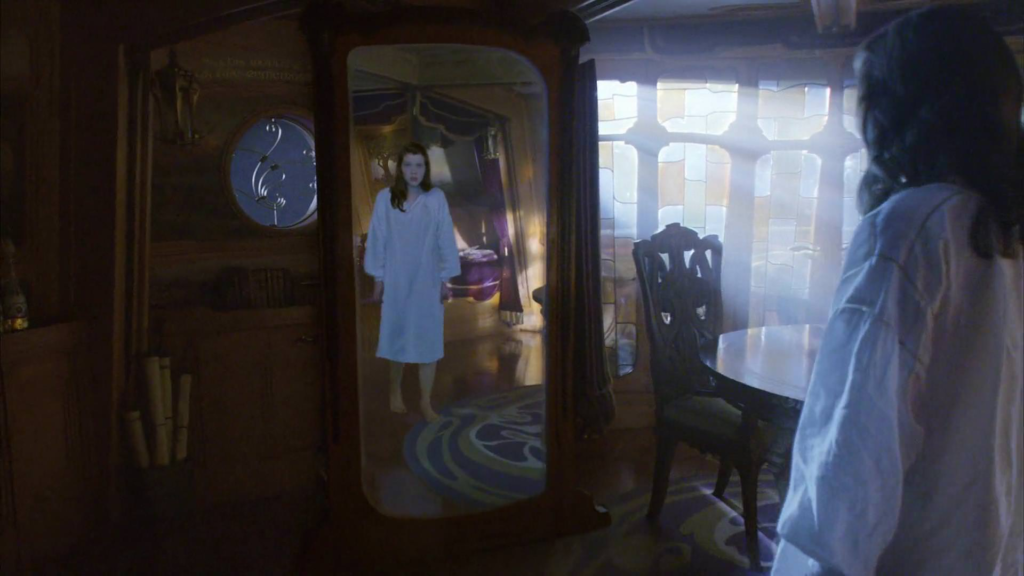
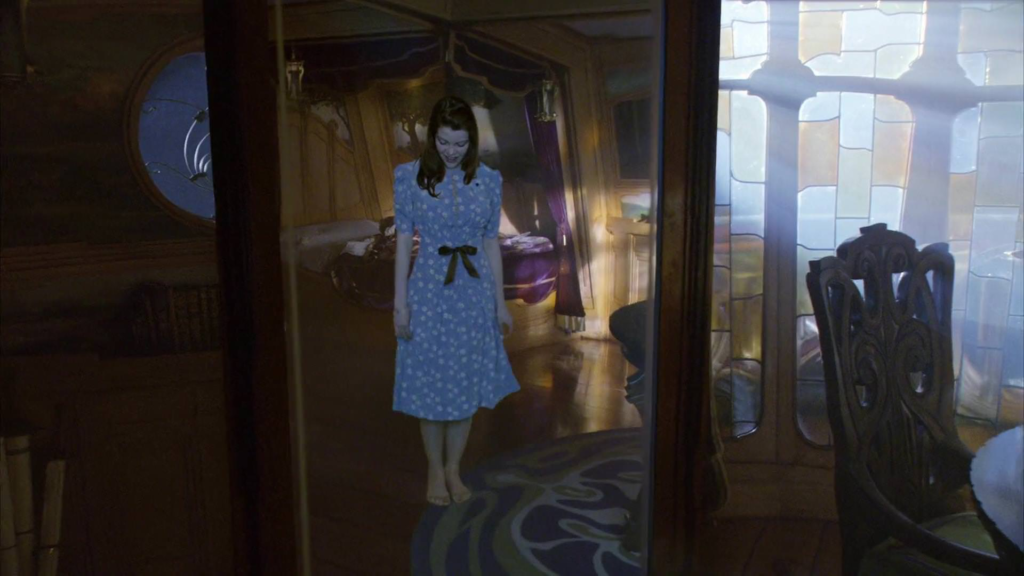
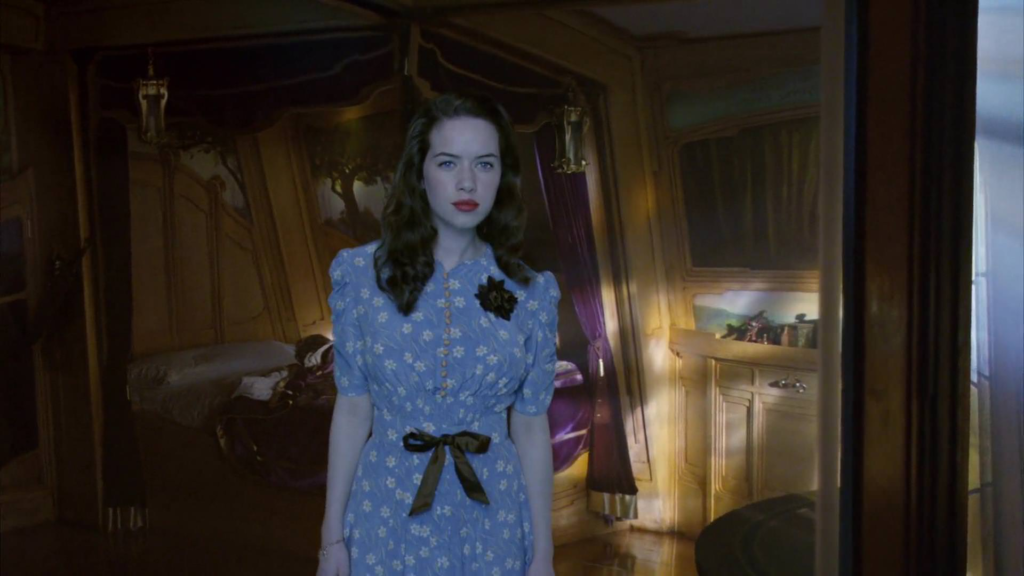
Lucy-or rather Susan-hears big band music of all things coming from behind the mirror. It turns into a door, and she steps through it onto a sunlit porch somewhere in America. A garden party is in swing. “Ladies and gentlemen, Miss Susan Pevensie,” announces a man and everyone applauds. Susan-or rather Lucy who looks like Susan-is starting to enjoy this.
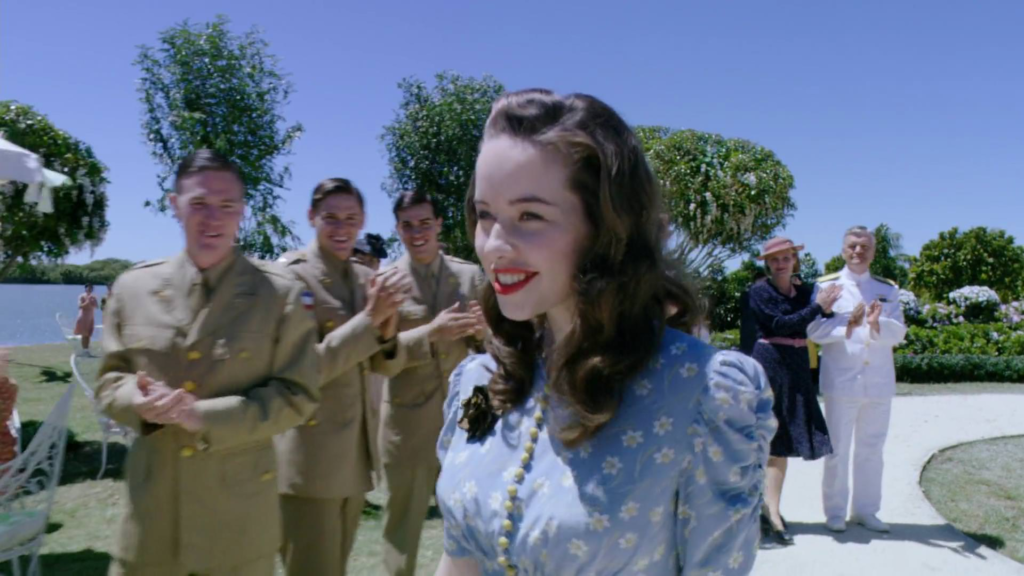
Her brothers fall in step with her.
Lucy: Edmund!
Edmund: You look beautiful, sister.
Peter (William Moseley): As always.
Lucy: Peter!
Photographer (Laurence Coy): Excuse me, Miss, can I get a photo?
Peter: Mother’s going to love this! All her children in one picture.
Photographer: Smile!
Lucy: Hang on. Where am I? I mean, where’s Lucy?
Edmund (through smile for camera): Lucy? Who’s Lucy?
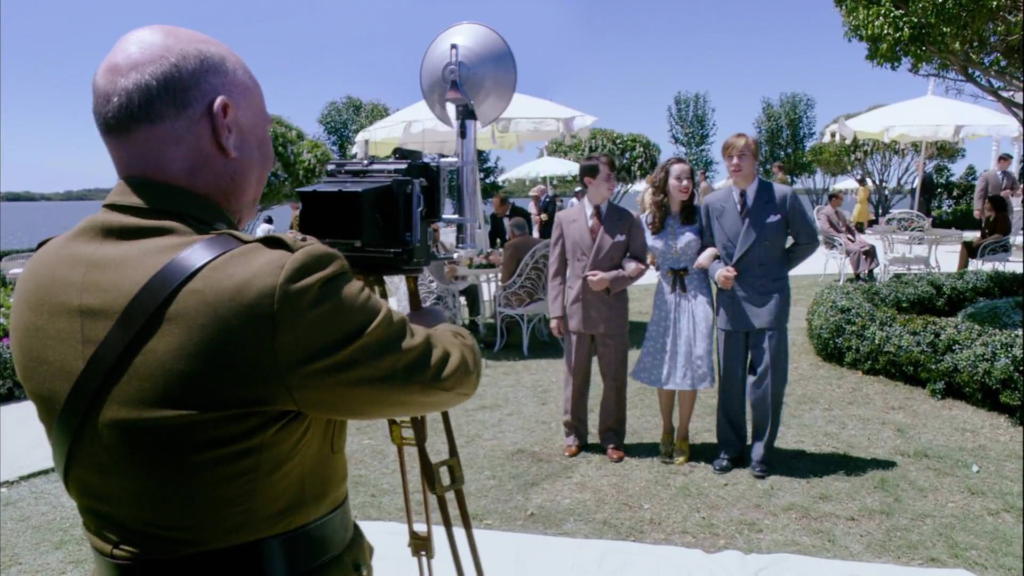
A startled Lucy tries to get away, but Peter holds onto her. “Susan, what’s wrong?” he asks, also speaking through his teeth. “Come on now, Miss,” says the photographer, “nice big smile!” But Lucy isn’t feeling it anymore.
Lucy: Edmund, I’m not sure about all this. I think I ought to go back.
Edmund: Go back where?
Lucy: To Narnia!
Edmund: What on earth is Narnia?
Lucy: What’s going on?! Stop this!
The camera flashes and suddenly Lucy is back in the cabin, looking into the mirror, her old self again though rather shaken. Well, that was…a thing. I feel like the scene went by far too quickly for us to feel what Lucy felt. I mean, the final thirds of entire movies have been about such scenarios but here no sooner has Lucy been horrified by the implications of the alternate universe she created than it’s all back to normal again. Not very cathartic. I suppose a longer scene in the Lucy-is-Susan world would have taken away from the main plot but why bother with something like creating an alternate reality if you’re not going to give it room to breathe? Anyway, Aslan appears beside Lucy’s reflection. She turns around but in a nice touch, he can only be seen in the mirror. The soundtrack plays a subdued, melancholy version of the Pevensies’ theme.
Aslan: What have you done, child?
Lucy: I don’t know. That was awful!
Aslan: But you chose it, Lucy.
Lucy: I didn’t mean to choose all of that! I just wanted to be beautiful like Susan. That’s all.
Aslan: You wished yourself away and with it much more. Your brothers and sister wouldn’t know Narnia without you, Lucy. You discovered it first, remember?
Lucy: I’m so sorry!
Aslan: You doubt your value. Don’t run from who you are.
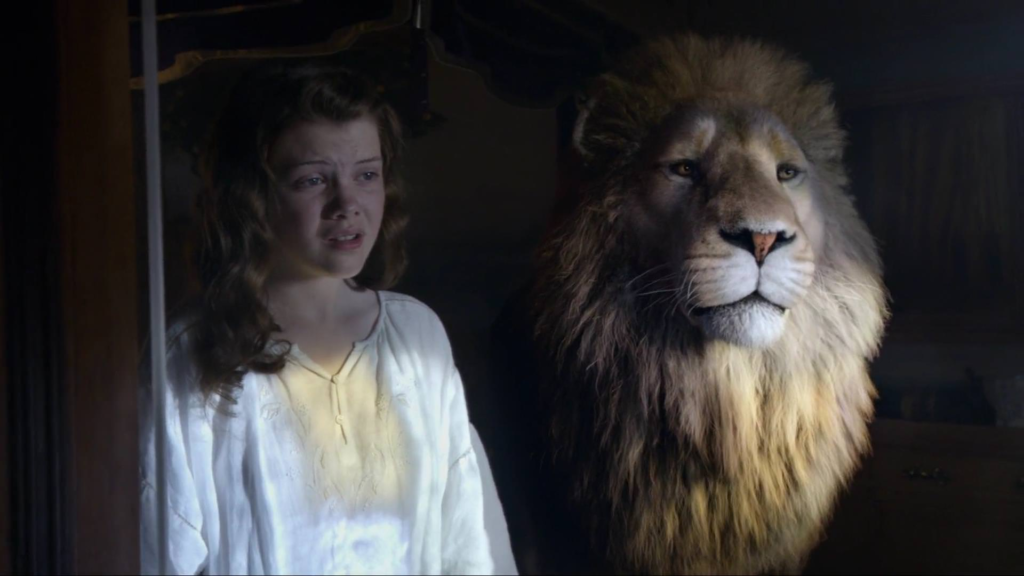
That’s the first big message we’ve gotten from this movie. I wouldn’t call it a bad message, especially if you interpret it as “be content with what you have.” But let’s compare it to those from the first two films, never mind the books. In The Lion, the Witch and the Wardrobe, the Pevensies learn to put the good of Narnia over their own lives. In Prince Caspian, Peter learned to give up his yearning for control and let others lead while Lucy learned she should stand up for her beliefs even if it means standing alone. And here the most profound thing she learns is “don’t run from who you are?” Talk about disappointingly trite. To be fair though, the book The Voyage of the Dawn Treader is mostly concerned with basic moral lessons like don’t enslave people, don’t be greedy, don’t eavesdrop, generally don’t be like Eustace, so you could argue this isn’t too far a stretch.[3]I’d maintain that the book has a larger spiritual theme of searching for the divine and the transcendent bolstering those basic lessons, but I digress. I’d still argue the book had more interesting things to say than just “be yourself.” In Lewis’s version, Lucy didn’t say the beauty spell, as I mentioned previously, but she did say a spell to learn what people said about her behind her back. She overheard one of her friends from back in her own world tell an enemy she had “more sense” than to be “taken up” with Lucy and was tired of her company. Naturally, this hurt, and Lucy vowed never to trust that friend again. Later, she and Aslan had this conversation.
“Child,” he said, “I think you have been eavesdropping.”
“Eavesdropping?”
“You listened to what your two schoolfellows were saying about you.”
“Oh that? I never thought that was eavesdropping, Aslan. Wasn’t it magic?”
“Spying on people by magic is the same as spying on them in any other way. And you have misjudged your friend. She is weak, but she loves you. She was afraid of the older girl and said what she does not mean.”
“I don’t think I’d ever be able to forget what I heard her say.”
“No, you won’t.”
“Oh dear,” said Lucy. “Have I spoiled everything? Do you mean we would have gone on being friends if it hadn’t been for this — and been really great friends — all our lives perhaps — and now we never shall.”
“Child,” said Aslan, “did I not explain to you once before that no one is ever told what would have happened?”
Now wasn’t that much more interesting than what the movie did?
Lucy wakes up to find the storm still going on. She crumples up the page with the spell on it and throws it into the fireplace. The smoke forms an image of Aslan’s head which roars. You’d think it would roar triumphantly but for some reason, it sounds angry.
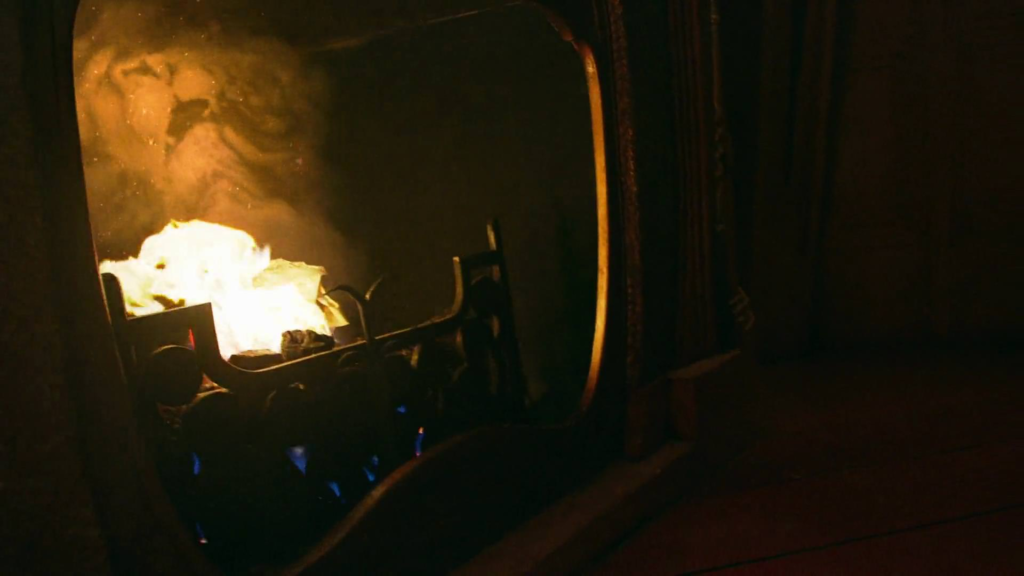
If that whole thing was an Aslan-sent dream by the way, does that mean the Green Mist was also part of it? I don’t know why Aslan would include that since Lucy didn’t seem to notice it. Anyway, the Mist wafts its way through the Dawn Treader’s sleeping quarters, still not looking as creepy as it should. Caspian tosses and turns in his slumber. “Father! Father!” he cries. A big cloud of Mist forms above Edmund. An all too familiar voice calls his name. In a flash of lightning, he sees the White Witch (Tilda Swinton.) “Join me!” she says. On the plus side, this moment is fairly effective in its creepiness.
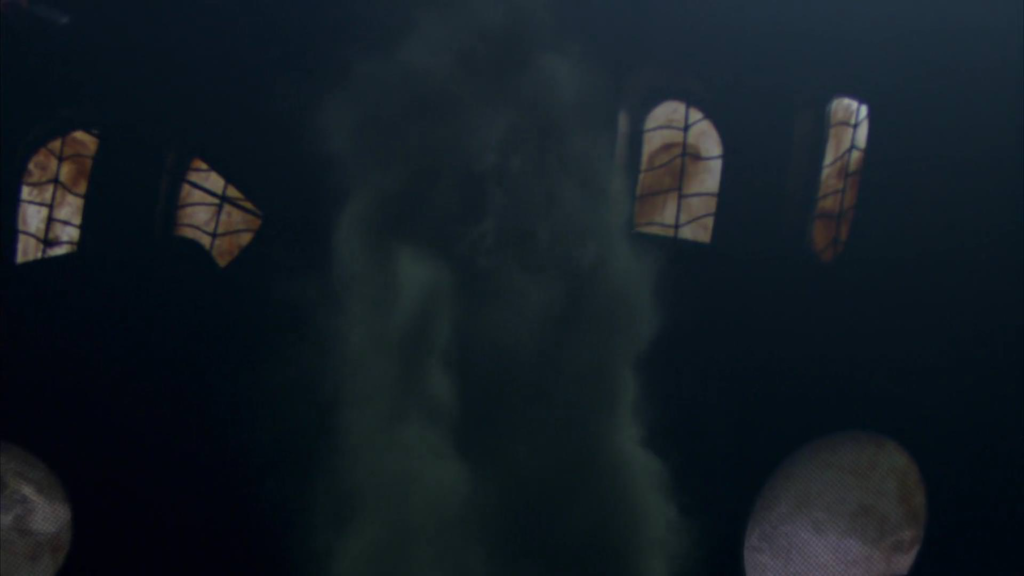
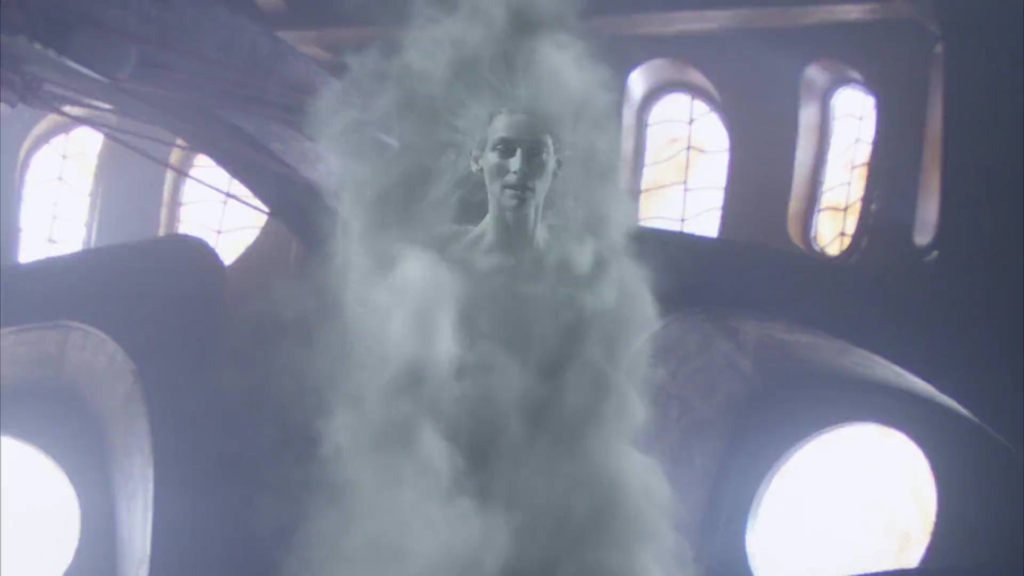
On the minus side, do we have to see the White Witch again? Maybe if they hadn’t temporarily brought her back from the dead in Prince Caspian, I would be more openminded about this, but they did temporarily bring her back and now it feels like overkill.[4]Overresurrection? I wonder if the screenwriters deeply regretted that she couldn’t be the villain of every story but didn’t want to offend the fanbase by having her survive The Lion, the Witch and the Wardrobe. As a member of that fanbase, I’m grateful for that but this compromise of having her keep seeming to return without really doing so gets lame after only two instances.
Flustered, Edmund draws his sword, but the Mist has disappeared and with it, the Witch. “Edmund?” whispers another voice. This time, it’s Lucy’s. “I can’t sleep,” she says. Edmund looks at her and at Caspian who has also awakened. “Let me guess,” he says. “Bad dreams. So either we’re all going mad or something’s playing with our minds.” Or you could you just be having bad dreams because you’re under a lot of stress, you know. That has been known to happen in life without any magical explanation. To the movie’s credit though, the Dark Island is very much connected to dreams, particularly nightmares, in the book and it’s nice that the adaptation tries to retain that somehow.
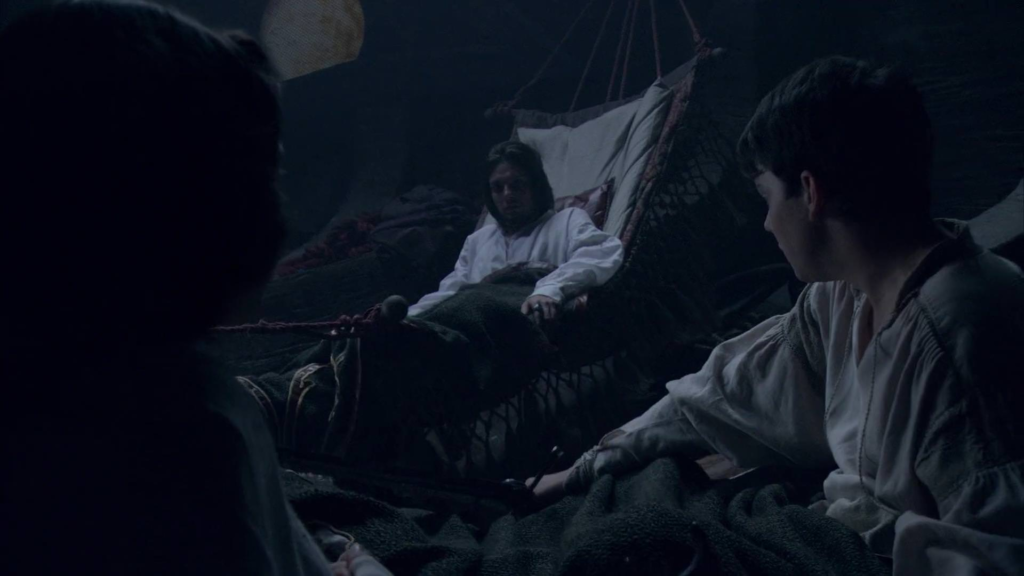
Next Week: I Take a Break from Narnia for a Halloween Post (Sort of)
References
| ↑1 | Technically, it’s just the search for his wife but whatever. |
|---|---|
| ↑2 | That’s what I’m calling his daughter, remember? |
| ↑3 | I’d maintain that the book has a larger spiritual theme of searching for the divine and the transcendent bolstering those basic lessons, but I digress. |
| ↑4 | Overresurrection? |
